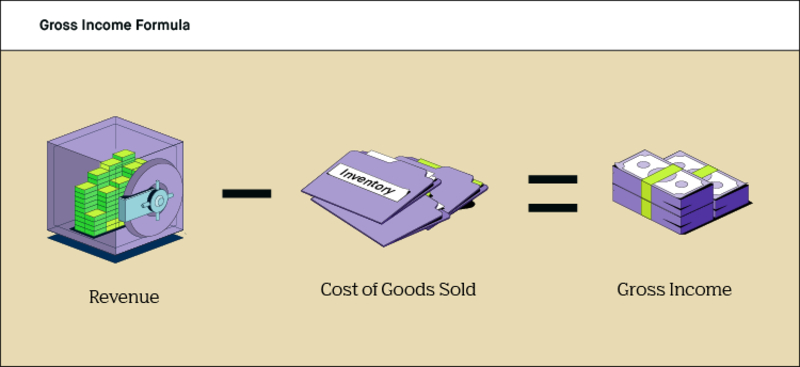Understanding Gross Income in Finance
May 20, 2024 By Susan Kelly
In finance, the term "gross income" is used to describe total earnings before any reductions. This concept plays a vital role in comprehending monetary well-being and making knowledgeable choices. The following article offers a complete understanding of gross income, discussing what it means as well as how to calculate it along with its importance in different finance-related situations.
Components of Gross Income
For full comprehension of gross income, you should identify its different parts. A typical list of these parts consists of wages or salary received for work, business profit made through operations, interest gained from investments, dividends earned from stocks owned by the person, and rental money coming in from property along with any other incoming money. When we add up all the pieces together it gives us what is called total gross income.

Knowing what makes up gross income gives people and businesses a complete understanding of where their money comes from, making them financially stable. It helps to identify areas that are strong and could have chances for growth. Also, it assists in recognizing how diverse income streams are important for spreading investments and reducing risks.
- Diverse Income Streams: Gross income comprises various sources of revenue, allowing for a diversified income portfolio.
- Risk Mitigation: Understanding the components helps in identifying potential risks associated with specific income streams, enabling proactive risk management.
Calculation of Gross Income
To find gross income, you add up money from all sources before any deductions. For a person, this can be wages or salary plus bonuses and tips along with rental income, interest received on savings accounts or dividends from investments as well as other earnings. For a business it's the total revenue from sales and services provided by the company along with income derived through investments in stocks/bonds etc., rent received for leasing out property among other activities that generate revenue for them. The formula for gross income is:
Gross Income=Total RevenueCost of Goods Sold (COGS)
Knowing how to calculate gross income is important for people and businesses, as it helps them correctly evaluate their financial progress and money-making ability. Gross income gives an understanding of the total amount of money earned before expenses are taken out. This knowledge is useful in planning finances well and making decisions related to revenue creation and cost handling.
- Revenue Management: Calculating gross income aids in analyzing revenue trends over time, facilitating better revenue management strategies.
- Profitability Analysis: By subtracting COGS from total revenue, businesses can evaluate their profitability and identify areas for cost optimization.
Importance of Gross Income
Gross income is an important measurement for understanding how well someone or a business can make money. It gives a view of the overall ability to create revenue and aids in evaluating total profit. Gross income also affects many financial choices like making budgets, planning investments, and deciding if someone can get a loan or not. Moreover, it plays a significant role in determining tax liabilities and filing requirements.
When people and businesses comprehend why gross income is crucial, they are better equipped to make wise choices about money. It provides a reference point for setting monetary objectives and assessing how well we are progressing towards meeting those targets. Being knowledgeable about gross income also assists in recognizing opportunities to increase income and decrease costs, which supports the ongoing financial health of a person or business.
- Financial Benchmark: Gross income acts as a benchmark for assessing financial health and setting realistic financial goals.
- Decision Making: Awareness of gross income influences various financial decisions, such as investment allocation and expenditure prioritization.
Significance in Taxation
In taxation, gross income is a key factor for calculating the amount that needs to be paid in taxes. Gross income helps tax authorities figure out how much tax an individual or business should pay. After considering different deductions and exemptions, the final taxable income is calculated. The tax rate is then applied to this amount to determine the person's or company's total due taxes. So, this is why knowing the gross income is very important for correct tax planning and following the rules of tax laws.
The importance of gross income in taxation highlights the need to correctly report and document income. It serves as a foundation for deciding tax duties and making sure that all tax rules are followed. Also, knowing how various sources of income add up to gross income helps in finding chances to save on taxes and managing tax responsibilities better.
- Tax Planning: Gross income serves as a foundation for tax planning, allowing individuals and businesses to optimize their tax liabilities legally.
- Compliance: Accurate reporting of gross income is essential for complying with tax laws and avoiding potential penalties.
Effect on Financial Planning

Gross income has a big impact on planning and deciding about finances. It helps people and companies understand how much they can earn, set reasonable money targets, and make plans to reach those goals successfully. Also, knowing the gross income assists in better budget-making, handling expenses as well as dividing savings for improved financial stability and growth.
Understanding the impact of gross income on financial planning enables people and businesses to make thoughtful financial choices. It facilitates an active control of money matters, such as modifying budgets, spreading out investments, or putting in place strategies for lessening risks. Furthermore, thinking about gross income in the process of planning finances ensures harmony with lasting money goals.
- Strategic Decision Making: Gross income insights inform strategic financial decisions, such as investment allocation and expenditure prioritization.
- Long-Term Financial Stability: Incorporating gross income considerations into financial planning promotes long-term financial stability and growth.
Conclusion
To sum up, gross income is a basic idea in finance. It shows all the money earned before taking away any amounts for different reasons. This includes many kinds of earning and it's very important for understanding how well financially something is doing, making choices based on facts, and following rules about taxes. When people or businesses know what gross income means and how to calculate it correctly, they become better at handling their money matters as well as planning to reach their economic objectives more effectively.
-
 Know-how May 19, 2024
Know-how May 19, 2024Decoding Adjusted Premiums: A Comprehensive Guide
Explore the impact of big data and predictive analytics on insurance premiums, the ethical considerations, and the role of regulatory oversight in the industry.
-
 Know-how Nov 25, 2023
Know-how Nov 25, 2023Demystifying the Annual Insurance Review: Your Simple Guide to Ensure Adequate Coverage
Unlock the secrets of an effective annual insurance review with our simplified guide. Learn to navigate your insurance policy, make informed decisions, and ensure your coverage meets your needs.
-
 Know-how Nov 03, 2023
Know-how Nov 03, 2023Short Term Car Lease
An arrangement you establish with a lessor to make payments on an automobile for a period that is no more than two years is known as a short-term car lease.
-
 Taxes May 19, 2024
Taxes May 19, 2024Foreign Direct Investment (FDI): Definition, Types, And Pros and Cons.
Learn about Foreign Direct Investments in this article: what they are, its types, benefits, and drawbacks.
